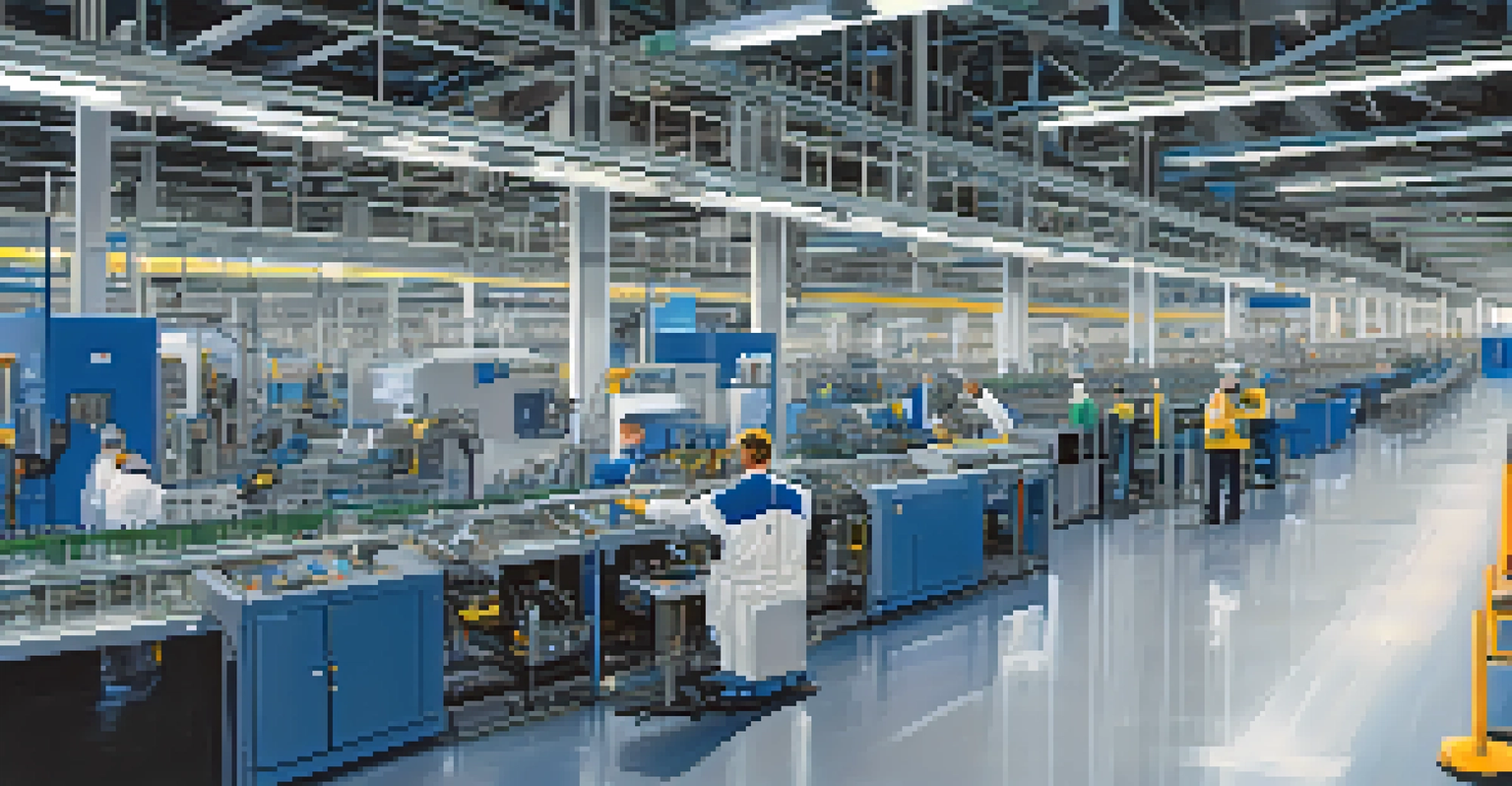Manufacturing Resurgence: St. Louis's Economic Backbone

Understanding St. Louis's Manufacturing History
St. Louis has a rich manufacturing history that dates back to the early 19th century. It emerged as a hub of innovation and production, especially during the industrial revolution, shaping the city’s identity. Factories and production lines lined the banks of the Mississippi River, providing jobs and driving economic growth.
Manufacturing is a key driver of economic growth, and a strong manufacturing sector is vital to a healthy economy.
However, like many industrial cities, St. Louis faced challenges in the late 20th century as manufacturing jobs began to decline. Global competition and technological advancements led to factory closures, leaving a mark on the local economy and workforce. This downturn made it clear that a revival was necessary to restore the city’s economic backbone.
Today, understanding this historical context is vital as St. Louis embarks on a path of resurgence. By learning from the past, the city is now positioning itself to reinvigorate its manufacturing sector and leverage its historical strengths for future success.
Key Sectors Driving Manufacturing Growth
St. Louis's manufacturing resurgence is fueled by several key sectors. Advanced manufacturing, which includes high-tech industries like aerospace and biotechnology, is at the forefront. These sectors are not only creating jobs but also attracting investment, revitalizing the local economy.

Another significant area of growth is food and beverage manufacturing, a nod to St. Louis's agricultural roots. Companies are capitalizing on local resources to produce everything from craft beers to gourmet snacks, which are gaining popularity both regionally and nationally. This sector not only employs thousands but also promotes local entrepreneurship.
St. Louis's Manufacturing Revival
St. Louis is revitalizing its manufacturing sector by embracing innovation and focusing on key industries such as advanced manufacturing and food production.
Lastly, the medical device manufacturing industry is booming in St. Louis. With renowned institutions like Washington University and St. Louis University leading research, the city is becoming a hotspot for medical innovation. This combination of sectors showcases the diverse manufacturing landscape that is pivotal for St. Louis's economic health.
The Role of Technology in Modern Manufacturing
Technology is a game-changer in today's manufacturing landscape, and St. Louis is no exception. The integration of automation and robotics is enhancing production efficiency, allowing businesses to produce goods faster and with greater precision. This shift not only boosts productivity but also helps in attracting tech-savvy talent to the region.
Sustainability is no longer about doing less harm. It's about doing more good.
Moreover, the advent of Industry 4.0—characterized by smart factories and the Internet of Things (IoT)—is revolutionizing the way manufacturers operate. In St. Louis, companies are investing in these technologies to optimize their supply chains and improve product quality. This focus on innovation is crucial for staying competitive in a global market.
As manufacturers in St. Louis embrace these technological advancements, they are not just improving their operations; they are also creating a skilled workforce ready for the future. Training programs and partnerships with local educational institutions are pivotal in ensuring that workers have the necessary skills to thrive in this new manufacturing era.
Local Policies Supporting Manufacturing Growth
Local government initiatives play a crucial role in supporting the manufacturing resurgence in St. Louis. Policymakers are recognizing the importance of manufacturing for economic stability and are implementing policies that encourage growth. This includes tax incentives for manufacturers, grants for technology upgrades, and support for workforce development programs.
Additionally, St. Louis is fostering a business-friendly environment that attracts both new and established manufacturers. By streamlining regulations and offering assistance for startups, the city is cultivating a vibrant ecosystem for innovation. This proactive approach is essential for retaining existing manufacturers and luring new ones to the area.
Technology Drives Efficiency
The integration of automation and Industry 4.0 technologies is enhancing production efficiency and attracting a skilled workforce to St. Louis.
Moreover, collaboration between public and private sectors is vital in creating a sustainable manufacturing model. Partnerships with local universities and research institutions ensure that manufacturers have access to cutting-edge research and skilled graduates, ultimately driving growth and innovation in the industry.
The Impact of Workforce Development Initiatives
A skilled workforce is essential for the success of St. Louis's manufacturing sector, and local initiatives are addressing this need head-on. Training programs aimed at equipping workers with the necessary skills are being implemented across the region. These programs often collaborate with manufacturing firms to ensure that the curriculum meets industry needs.
Furthermore, apprenticeship and internship opportunities have become more prevalent, allowing students to gain hands-on experience in real-world manufacturing environments. This not only prepares the next generation for careers in manufacturing but also helps companies identify potential talent early on. Such initiatives are crucial in bridging the skills gap.
As a result, St. Louis is witnessing a renewed enthusiasm for careers in manufacturing. By investing in workforce development, the city is not only securing its manufacturing future but also empowering its residents with sustainable job opportunities that can support their families for years to come.
Sustainability in St. Louis Manufacturing
Sustainability is becoming a key focus in St. Louis's manufacturing resurgence, as businesses recognize the importance of environmentally responsible practices. Companies are investing in greener technologies and processes, aiming to reduce waste and energy consumption. This shift not only benefits the environment but also enhances their competitiveness in a market that increasingly values sustainability.
Moreover, many manufacturers in St. Louis are adopting circular economy principles, which involve reusing materials and minimizing waste. By rethinking traditional production methods, these companies are contributing to a more sustainable future while also reducing costs. This innovative approach is gaining traction and positioning St. Louis as a leader in sustainable manufacturing.
Sustainability in Manufacturing
St. Louis manufacturers are increasingly adopting sustainable practices, which not only benefit the environment but also enhance competitiveness in the market.
As the city moves forward, the emphasis on sustainability will likely attract environmentally conscious consumers and businesses alike. St. Louis's commitment to sustainable manufacturing practices not only strengthens its economic core but also helps build a healthier community.
The Future of Manufacturing in St. Louis
Looking ahead, the future of manufacturing in St. Louis appears promising. As the city continues to embrace innovation and technology, the potential for growth is significant. With a strong foundation built on its historical strengths and a forward-thinking approach, St. Louis is ready to redefine its manufacturing landscape.
The collaborative efforts between government, educational institutions, and industry leaders will play a crucial role in shaping this future. By focusing on workforce development, sustainability, and technological advancements, St. Louis is laying the groundwork for a resilient and adaptive manufacturing sector. This collective vision will be pivotal in attracting new businesses and talent to the area.

Ultimately, St. Louis's manufacturing resurgence is not just about economic growth; it's about creating a vibrant community. By investing in its manufacturing sector, the city is not only strengthening its economy but also enhancing the quality of life for its residents. This holistic approach will ensure that St. Louis remains a key player in the manufacturing industry for years to come.